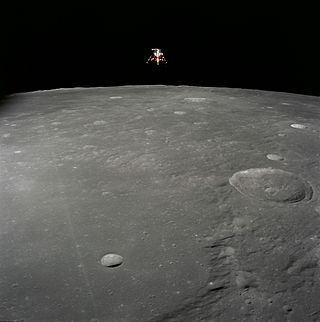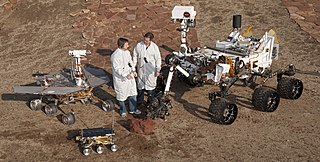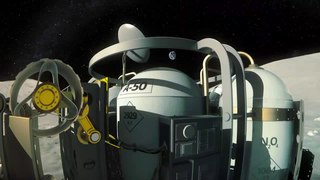Related Research Articles

Lunokhod was a series of Soviet robotic lunar rovers designed to land on the Moon between 1969 and 1977. Lunokhod 1 was the first roving remote-controlled robot to land on an extraterrestrial body.

Lunokhod 1, also known as Аппарат 8ЕЛ № 203 was the first robotic rover on the Moon and the first to freely move across the surface of an astronomical object beyond the Earth. Sent by the Soviet Union it was part of the robotic rovers Lunokhod program. The Luna 17 spacecraft carried Lunokhod 1 to the Moon in 1970. Lunokhod 0 (No.201), the previous and first attempt to land a rover, launched in February 1969 but failed to reach Earth orbit.

Lunokhod 2 was the second of two uncrewed lunar rovers that landed on the Moon by the Soviet Union as part of the Lunokhod programme.

Luna 17 was an uncrewed space mission of the Luna program, also called Lunik 17. It deployed the first robotic rover onto the surface of the Moon.

A Moon landing or lunar landing is the arrival of a spacecraft on the surface of the Moon, including both crewed and robotic missions. The first human-made object to touch the Moon was Luna 2 in 1959.

The physical exploration of the Moon began when Luna 2, a space probe launched by the Soviet Union, made a deliberate impact on the surface of the Moon on September 14, 1959. Prior to that the only available means of lunar exploration had been observations from Earth. The invention of the optical telescope brought about the first leap in the quality of lunar observations. Galileo Galilei is generally credited as the first person to use a telescope for astronomical purposes, having made his own telescope in 1609, the mountains and craters on the lunar surface were among his first observations using it.

A rover is a planetary surface exploration device designed to move over the rough surface of a planet or other planetary mass celestial bodies. Some rovers have been designed as land vehicles to transport members of a human spaceflight crew; others have been partially or fully autonomous robots. Rovers are typically created to land on another planet via a lander-style spacecraft, tasked to collect information about the terrain, and to take crust samples such as dust, soil, rocks, and even liquids. They are essential tools in space exploration.

The Google Lunar X Prize (GLXP) was a 2007–2018 inducement prize space competition organized by the X Prize Foundation, and sponsored by Google. The challenge called for privately funded teams to be the first to land a lunar rover on the Moon, travel 500 meters, and transmit back to Earth high-definition video and images.

Astrobotic Technology inc., commonly referred to as Astrobotic is an American private company that is developing space robotics technology for lunar and planetary missions. It was founded in 2007 by Carnegie Mellon professor Red Whittaker and his associates with the goal of winning the Google Lunar X Prize. The company is based in Pittsburgh, Pennsylvania. Their first launch occurred on January 8, 2024, as part of NASA's Commercial Lunar Payload Services (CLPS) program. The launch carried the company's Peregrine lunar lander on board the first flight of the Vulcan Centaur rocket from Florida's Space Force Station LC-41. The mission was unable to reach the Moon for a soft or hard landing. On June 11, 2020, Astrobotic received a second contract for the CLPS program. NASA would pay Astrobotic US$199.5 million to take the VIPER rover to the Moon, targeting a landing in November 2024. In July 2024, NASA Announced that VIPER had been cancelled.
The 1964 Danish 1st Division was the 37th season of Denmark's top-flight association football division since the establishment of Danmarksturneringen's nation-wide league structure in 1927, and the 51st edition of the overall Danish national football championship since its inception in 1912. Governed by the Danish FA, the season was launched on 26 March 1964 with a clash between last season's third-placed B 1903 and Østerbro-based and local rivals B.93 with the last round of six matches concluding on 15 November 1964. Esbjerg fB were the defending league champions, having won their third consecutive league title last season, while BK Frem and B.93 entered as promoted teams from the 1963 Danish 2nd Division. Fixtures for the 1964 season were announced by the Danish FA's tournament committee on 6 January 1964, featuring a nine weeks long summer break.

Team FREDNET is an international Open Source and Open Participation competitor in the Google Lunar X PRIZE competition. Uniquely, the team also allows organizations and individuals to participate freely in its mission through the team's website. Their strategy is to utilize the same approach for developing open source software in order to build a lunar lander and a lunar rovers capable of winning the Google Lunar X Prize. Team FREDNET plans to establish an Open Space Foundation that provides incentives, education, and funding to future individuals and organizations seeking to develop their own space projects. In addition, they hope to foster greater public interest and education in Space Exploration and Research.

Hakuto (ハクト) or formerly White Label Space (ホワイトレーベルスペース) was a team formed in early 2008 by a group of experienced space professionals inspired by the challenge of the Google Lunar X PRIZE to develop a robotic Moon exploration mission.
Planetary Transportation Systems (PTS), formerly known as PTScientists and Part-Time Scientists, is a Berlin-based aerospace company. They developed the robotic lunar lander "ALINA" and seek to land on the Moon with it. They became the first German team to officially enter the Google Lunar X-Prize competition on June 24, 2009, but failed to reach the finals in 2017 for lack of a launch contract. During the summer of 2019, the company filed for bankruptcy, and the ALINA project was put on hold. In July 2021, PTS was selected with ArianeGroup to build ESA's ASTRIS kick-stage.
The (Japanese) Lunar Exploration Program is a program of robotic and human missions to the Moon undertaken by the Japanese Aerospace Exploration Agency (JAXA) and its division, the Institute of Space and Astronautical Science (ISAS). It is also one of the three major enterprises of the JAXA Space Exploration Center (JSPEC). The main goal of the program is "to elucidate the origin and evolution of the Moon and utilize the Moon in the future".
TeamIndus is a private for-profit aerospace company headquartered in Bangalore, India. It consists of a team of professionals from various backgrounds in science, technology, finance, and media, that came together in 2010 with the aim of winning the Google Lunar X Prize competition announced in 2007. Although the competition ended in 2018 without a winner, TeamIndus is still working towards developing and launching their lunar rover mission sometime in 2020 after partnering with OrbitBeyond.

Synergy Moon is an international commercial enterprise dedicated to the development of space technologies and related services.
Team AngelicvM is a private company based in Chile that plans to deploy a small rover on the Moon. Their rover, called Unity, is one of various rovers that will be carried by the commercial Peregrine lander manufactured by Astrobotic Technology.
ispace Inc. is a public Japanese company developing robotic spacecraft and other technology to compete for both transportation and exploration mission contracts from space agencies and other private industries. ispace's mission is to enable its clients to discover, map, and use natural lunar resources.
References
- ↑ "Google Luna X page on Euroluna". Archived from the original on 2010-11-21. Retrieved 2009-03-09.
- ↑ "The Team - Euroluna" . Retrieved 17 December 2009.
- ↑ New teams join $30 million moon rover contest, NBC News, 2008-12-16, accessed 2010-08-03.